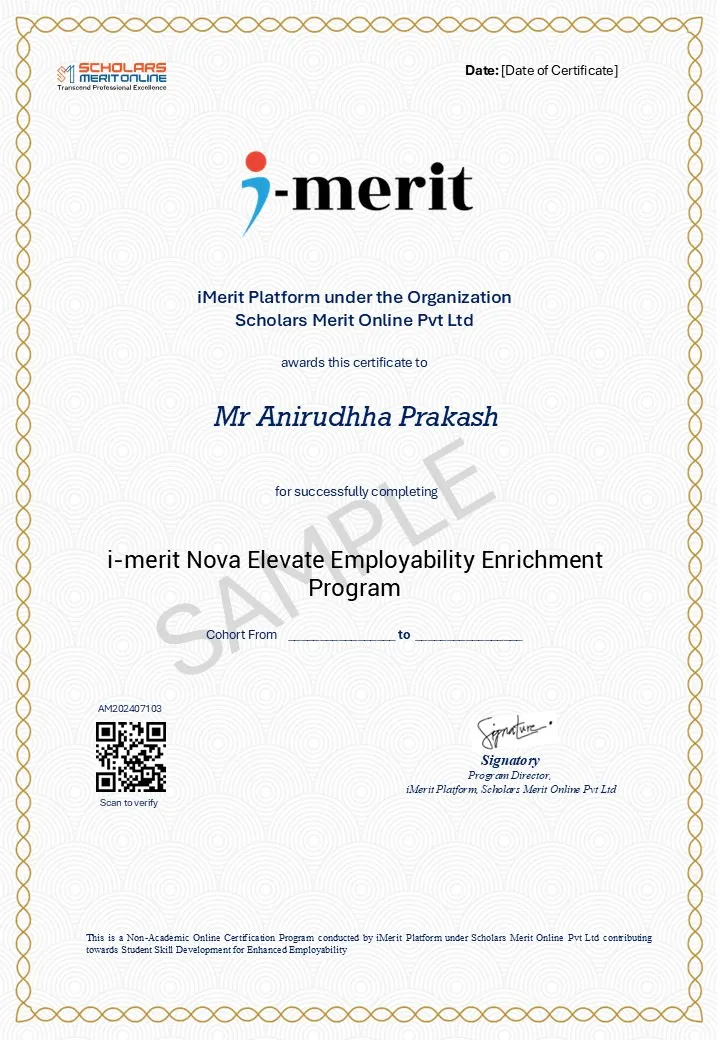
Professional Certificate Program
Learn to introduce yourself effectively and build your personal brand.
Covers self-introduction techniques, confidence building, and crafting a personal brand identity.
Role plays are interactive exercises where participants act out scenarios to practice skills and improve communication, problem-solving, and decision-making.
Peer feedback is when colleagues review and provide input on each other's work, fostering improvement and collaboration.
A personal brand is the unique combination of skills, experiences, and values that define an individual's professional identity, helping them stand out in their field.
A workshop is an interactive session where participants engage in practical activities to learn or improve specific skills.
EMI Facility Available on Checkout.
You will be allocated the cohort post successful payment of your fee. You may check the details of our upcoming cohorts in our Timetable section or please wait for your email on this topic once you have completed the payment.
Communication, Leadership, Teamwork
12-WEEKS CURRICULUM AND SCHEDULE
1. Course Overview & Objectives.
2. Importance of Self Introduction in Professional World.
3. Practice: Individual Self Introduction.
4. Feedback Sessions.
1. Technique for Confidence in Communication.
2. Role Play: Introducing yourself in Formal and Informal settings.
3. Practical: Peer to Peer Introductions.
4. Feedback and Reflection.
1. Understanding Personal Branding and Goals.
2. Workshop: Creating a personal brand statement.
3. Reflection and Review: Peer Feedback on brand statements.
1. Techniques for Clear and Effective Verbal Communication.
2. Group Discussions and Mock Meetings.
3. Feedback on Speaking Style and Clarity.
1. Importance of Body Language and Tone.
2. Practical: Non-verbal cues exercise (gestures, posture, expressions).
3. Feedback on Speaking Style and Clarity.
1. Email Etiquette and Professional Writing.
2. Practical: Writing Professional Emails.
3. Review and Peer Feedback.
1. Structuring an Effective Resume (Headlines, Skills, Achievements).
2. Practical: Drafting Resumes.
3. Review and Peer Feedback.
1. Tailoring Resumes for Specific Job Profiles.
2. Workshop: Refining Resumes Based on Peer Feedback.
3. Group Reflection.
1. Importance of Cover Letters and Personal Statements.
2. Practical: Drafting Cover Letters for Mock Job Applications.
3. Review and Feedback.
1. Understanding Emotional Intelligence.
2. Exercise in Self-awareness and Reflection.
3. Group Discussion: Managing Emotions in the Workspace.
1. Practice Empathy and Perspective Taking.
2. Role Play: Understanding the Needs and Emotions of Others.
3. Peer Review: Feedback on Empathy Exercises.
1. Building Strong Relationships through EQ.
2. Case Studies: Using Emotional Intelligence to Resolve Conflicts.
3. Reflection and Discussion.
1. The Importance of Teamwork and Collaboration.
2. Group Activity: Collaboration Task in Teams.
3. Reflection on Team Dynamics.
1. Identifying and Resolving Conflicts in Teams.
2. Role Play: Conflict Resolution Scenarios.
3. Feedback on Conflict Management Skills.
1. Teamwork in Practice: Reflection on Group Work.
2. Peer Feedback on Contributions to Team Projects.
3. Discussion on Leadership in Teams.
1. Introduction to Problem Solving Frameworks.
2. Case Study: Solving a Complex Business Problem.
3. Group Discussion and Peer Feedback.
1. Techniques for Creative Thinking in Problem Solving.
2. Brainstorming Exercises: Group Projects.
3. Presentation and Feedback.
1. Decision Making Models and Techniques.
2. Scenario-Based Decision Making.
3. Reflection and Peer Review.
1. Eisenhower Matrix and Pomodoro Technique.
2. Practical Task: Prioritization Exercises.
3. Peer Review on Prioritization Approaches.
1. Strategies to Stay on Track with Deadlines.
2. Group Discussion: Time Management Challenges.
3. Practical: Simulated Deadline-Driven Project.
1. Tools for Organization (Trello, Asana).
2. Real-Time Task Management Simulations.
3. Peer and Instructor Feedback.
1. Structuring a Speech or Presentation.
2. Practice: Delivering a Short Speech.
3. Feedback on Speaking Style & Confidence.
1. How to Create Engaging Presentations.
2. Workshop: Creating Storylines.
3. Reflection and Peer Feedback.
1. Techniques for Managing Audience Questions.
2. Practice: Mock Presentation with Q&A.
3. Peer Review and Feedback.
1. How to Build & Leverage Professional Networks.
2. Practical: Simulated Networking Event.
3. Reflection on Networking Techniques.
1. Traits of a Good Leader.
2. Group Projects: Leadership Role Assignments.
3. Reflection on Leadership Performance.
1. Negotiation Tactics and Influencing Techniques.
2. Practical: Role Play – Salary Negotiation Scenario.
3. Peer Review and Reflection.
Get certified to gain exciting career opportunitiesAdd the certification to your resume and open doors to new opportunities in the roles of:
|

|
➤ Student must have passed or is pursuing last semester of the Qualified Degree program that is being pursued.
➤ Candidates who completed these programs within the past year are also eligible, provided they meet all other criteria.
➤ Students who have passed these courses in less than One Year are also eligible to join the program within the criteria defined.
✅ Qualified Degree Programs:
All candidates must go through the defined selection process and meet the criteria to enroll in the program.
Note: A face-to-face interview may be required (not mandatory for all).
Profile Summary: A dynamic facilitator with 8+ years training Fortune 500 teams in persuasive communication, executive presence, and stakeholder management. Former HR leader turned coach, specializing in bridging technical and non-technical teams. Certified in DISC assessment and emotional intelligence frameworks. Transforms engineers into confident communicators through immersive role-plays and real-world case studies.
Key Focus Areas:
Profile Summary: A Scrum Master-turned-trainer with 6+ years in tech organizations, optimizing team productivity through soft skills. Expert in conflict resolution, psychological safety, and remote collaboration best practices. Integrates Agile principles with interpersonal skill development for high-performance engineering teams.
Key Focus Areas:
Profile Summary: A talent development professional with 7+ years preparing technical professionals for career growth. Specializes in resume crafting, behavioral interview mastery, and personal branding for the digital age. Has coached 500+ engineers through promotions and job transitions with proven results.
Key Focus Areas:
Profile Summary: An organizational psychologist with 9+ years implementing wellbeing programs across IT/ITES sectors. Combines neuroscience-based EQ training with practical stress management tools. Certified in mindfulness-based stress reduction (MBSR) and non-violent communication.
Key Focus Areas: